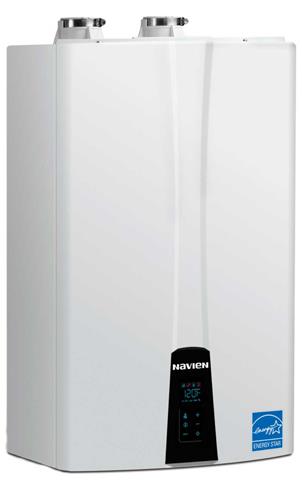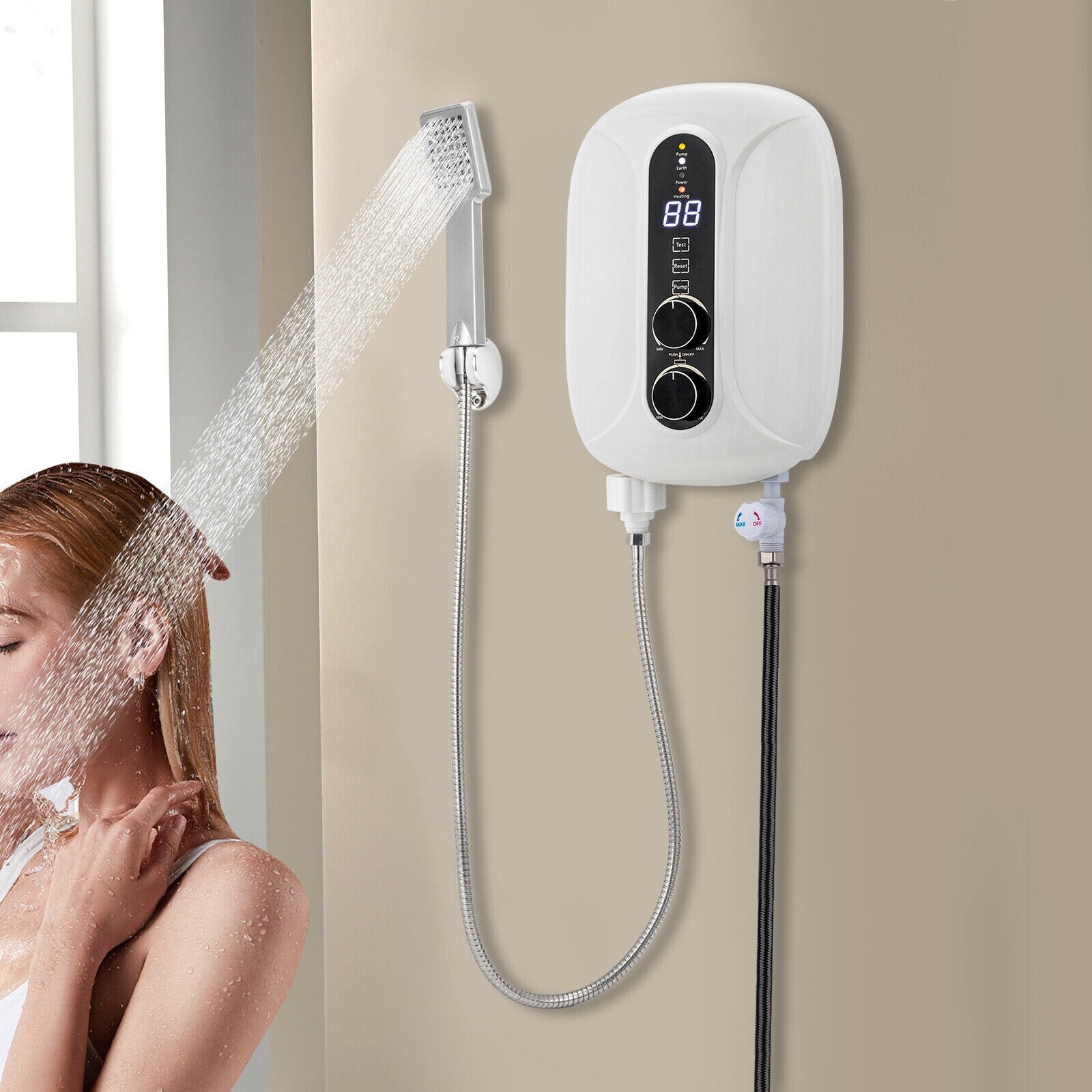What Tankless Water Heaters Enhance Homeowners’ Benefits
What Tankless Water Heaters Enhance Homeowners’ Benefits
Blog Article
On this page in the next paragraphs you will find lots of brilliant answers regarding Pros and Cons of Tankless Water Heater.

In a world where comfort and efficiency reign supreme, it's not a surprise that property owners are continuously looking for smarter means to manage their home's power intake and comfort. One advancement that has actually progressively gotten popularity is the tankless hot water heater. However exactly what makes these systems stand out from the standard tank-based models a lot of us grew up with? Allow's dive in and check out the benefits of tankless hot water heater, helping you make a decision if it's time to make the button in your home.
Intro
Image this: you step into the shower after a lengthy day, expecting a calming cascade of warm water, only to be welcomed by icy beads due to the fact that the last person utilized it all up. Sound familiar? Traditional hot water heater store a set quantity of hot water, meaning you go to the mercy of that tank's supply. Tankless systems, on the other hand, warm water on demand. Say goodbye to running out mid-shower, say goodbye to fumbling with timetables just to make sure hot water is available.
Comprehending Tankless Hot Water Heater
What Are Tankless Water Heaters?
Tankless water heaters, occasionally known as on-demand or instantaneous hot water heater, supply hot water only as it's required. Instead of keeping gallons of pre-heated water, these units kick right into activity the moment you activate the tap. Water goes through a warm exchanger, heating up in real-time, implying you get an uninterrupted flow of hot water without the demand for a big storage tank sitting lazily by.
Exactly how Do They Vary from Typical Solutions?
Typical heating units hold a reservoir of warm water, making use of power to keep that storage tank at a consistent temperature. Tankless devices remove the standing supply, lowering squandered energy and the cumbersome impact of a large cylinder. Basically, you're updating from a "accumulation" mindset to a "made-to-order" approach.
Typical Sorts Of Tankless Units
Tankless hot water heater typically are available in 2 varieties: gas and electric. Gas designs often tend to supply higher circulation rates, suitable for larger households, while electrical designs often offer smaller homes and are generally simpler to install. Additionally, some systems are designed for point-of-use (serving one component) while others can take care of the whole home's warm water needs.
Key Advantages of Tankless Hot Water Heater
Power Effectiveness and Cost Savings
No more heating up a titan storage tank's well worth of water and maintaining it toasty all the time. Tankless heaters minimize standby power losses, which can lower energy bills. While the first cost might be higher, the lasting financial savings often validate the financial investment.
3. Space-Saving Layout
If your home is short on storage space, getting rid of the bulky storage tank maximizes useful room. Tankless devices are portable and can usually be installed on wall surfaces, stashed in corners, or mounted in tight utility wardrobes without having all to oneself the whole area.
4. Longer Life-span
A well-kept tankless water heater can outlast its tank-based cousin. Traditional containers may last 10-15 years, while tankless models can maintain downing along for twenty years or more, making them a strong investment with time.
1. Limitless Hot Water Supply
Ever before had to set up showers so everybody obtains their fair share of warm water? With tankless, that becomes a thing of the past. As long as the heating unit's circulation ability isn't exceeded, you can take back-to-back showers without turning into a popsicle.
5. Improved Water High Quality
Storing water in a tank can in some cases cause sediment accumulation or a somewhat "off" preference. With tankless systems, fresh water is warmed on the spot, minimizing the chances of sediment accumulation and possibly offering cleaner-tasting water.
Factors to consider Prior To Switching
Though the benefits are compelling, it's wise to consider a few elements before fully committing.
Evaluating Your Home's Water Use Patterns
If your house all at once uses numerous fixtures with high warm water need, ensure the system's circulation rate meets your requirements. Recognizing your usage patterns helps you select the best dimension and kind of tankless heating system.
Maintenance and Treatment Tips
Tankless systems are reasonably reduced maintenance, however they aren't set-it-and-forget-it devices.
Regular Cleaning and Descaling
Difficult water minerals can accumulate in the heat exchanger, impacting efficiency. Routine descaling (often recommended yearly) keeps the system running at peak performance.
Annual Professional Assessments
A yearly checkup from a specialist ensures minor problems are captured early. They'll examine the unit's efficiency, search for leakages, and help keep ideal effectiveness.
Initial Financial Investment Expenses
Tankless heating units generally feature a higher ahead of time price tag. In between the unit itself and prospective installation adjustments, the first cost may offer you sticker shock. However remember to see it as a long-term financial investment.
Installment Demands
Depending on your home's facilities, you could need extra electric capacity or gas line upgrades. Ensure you comprehend the installment requirements and seek advice from a professional to avoid surprises.
Making Sure Correct Air Flow
For gas designs, appropriate air flow is vital to safely eliminate exhaust gases. Ensure airing vent systems are tidy and appropriately set up to prevent any kind of potential safety and security risks.
Contrasting Different Brands and Designs
Not all tankless water heaters are produced equal.
Investigating Dependable Makers
Look for trusted brands with a history of generating high quality units. A trusted manufacturer usually offers far better customer assistance and longer warranties.
Setup: Do It Yourself or Professional?
While some house owners relish dealing with jobs themselves, tankless installment might not be the best time to burst out the tool kit.
Pros and Cons of DIY Setup
A DIY mount could save money, yet it features risks. Inaccurate installment can result in inadequacy or security issues. If you come in handy and have experience, it might be practical-- however wage care.
Checking Out Testimonials and Customer Responses
Customer testimonials and responses from next-door neighbors or buddies who have gone tankless can supply useful understandings. Often, real-life experiences can be a lot more telling than marketing brochures.
When to Call a Specialist Plumbing Professional
For a lot of, calling a pro ensures every little thing's done properly. A professional plumbing professional comprehends local codes, sizing needs, and venting specifications, lowering the danger of incidents.
Optimizing Performance
You have actually invested in a tankless unit-- currently optimize its effectiveness.
Optimum Temperature Settings
The majority of people set their units between 120-140 F. Adjusting the temperature level can enhance comfort and financial savings. Experiment to find a wonderful spot that doesn't waste energy.
Pairing with Low-Flow Fixtures
Want to stretch your system's capacities? Take into consideration mounting low-flow showerheads and faucets. They reduce water use, permitting your tankless system to provide a constant stream of warm water without straining.
Environmental Influence
Tankless water heaters straighten with greener living goals.
Decreased Carbon Impact
By utilizing less power and only home heating water as needed, tankless systems can reduce your home's carbon footprint, reducing your environmental influence.
Conserving Natural Resources
Less power intake and much less wasted hot water convert right into fewer natural deposits being used, an environmental win-win.
That Benefits Most from Tankless Heating systems?
The appeal of tankless heaters is that they can fit a variety of families.
Large Households vs. Solitary Occupants
Huge families may enjoy the unlimited warm water supply, while solitary occupants appreciate the energy cost savings from not heating up a whole storage tank for simply a single person's early morning shower.
Property Owners with Restricted Area
If your home is short on square video, shedding the cumbersome container liberates room for various other essentials-- or perhaps simply more breathing space.
Eco-Conscious Customers
Going tankless aligns with environmentally friendly worths, guaranteeing you're not squandering power or resources.
Future Trends in Tankless Hot Water Heater
The world of home devices is ever-evolving, and tankless water heaters are no exemption.
Innovations in Modern technology
R&D is constantly boosting heat exchangers, making devices extra efficient and durable. Future designs might be even quieter, more small, and far better suited for varying environments.
Smart Home Integration
Visualize adjusting your hot water heater's temperature level via an app or obtaining upkeep alerts on your phone. As wise home technology advances, we'll see more connection and convenience.
Verdict
Choosing a tankless hot water heater is more than simply upgrading your home's warm water system; it's purchasing lasting comfort, power performance, and a greener way of life. By considering your house's water use, being mindful of setup demands, and committing to normal upkeep, you can delight in a stable stream of hot water without the luggage of a cumbersome container. As technology evolves, you can expect even smarter, extra efficient tankless remedies that not just make your life simpler yet additionally benefit the world.
Why You Should Consider a Tankless Water Heater for Your Home
Energy Efficiency and Cost Savings
Tankless water heaters, also known as on-demand water heaters, heat water only when needed. This means they don't waste energy keeping a tank of water hot constantly. This efficiency translates into substantial cost savings on your monthly energy bills.
Endless Hot Water Supply
One of the significant advantages of tankless water heaters is their ability to provide a continuous supply of hot water. Traditional tank water heaters have a limited capacity and can run out of hot water, especially during peak usage times. In contrast, tankless water heaters can provide an endless stream of hot water, making them ideal for larger families or homes with high water usage.
Space-Saving Design
Tankless water heaters are compact and take up significantly less space compared to traditional tank heaters. They can be installed on walls, under cabinets, or even outside, freeing up valuable space in your home. This makes tankless water heaters a great option for smaller homes or properties with limited space for a traditional water heater.
Longer Lifespan and Lower Maintenance
Tankless water heaters typically have a longer lifespan compared to traditional tank heaters. They can last up to 20 years or more with proper maintenance. Additionally, tankless systems are designed with replaceable parts, which can extend their lifespan further and reduce long-term maintenance costs.
Environmentally Friendly
Reducing energy consumption not only saves you money but also benefits the environment. Tankless water heaters contribute to a smaller carbon footprint by using less energy to heat water. Their energy efficiency and ability to minimize standby heat loss make them an eco-friendly choice for environmentally conscious homeowners.
Customized Temperature Control
Tankless water heaters offer precise temperature control, allowing you to set the desired temperature to meet your specific needs. This level of customization ensures you always have water at the perfect temperature for your comfort and usage requirements.
https://beantownservices.com/blog/consider-tankless-water-heater-for-your-home

I ran across that content on Unveiling the Hot Trend: The Benefits of Tankless Water while perusing the web. Appreciated our piece? Please share it. Let someone else discover it. Thank you for your time invested reading it.
Go Company Report this page